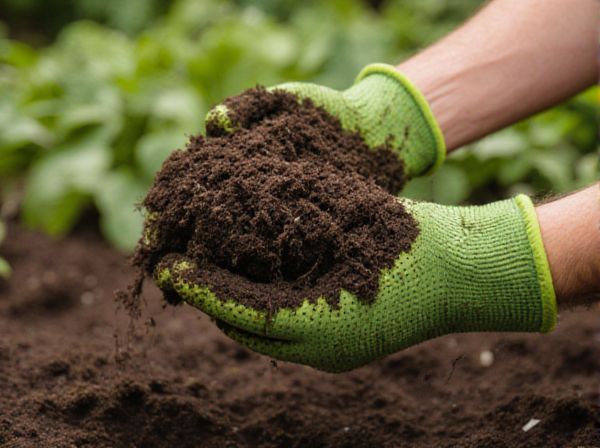
Green Manure vs Animal Manure Illustration
Green manure enriches soil by incorporating nitrogen-fixing plants that improve soil fertility naturally, while animal manure provides organic matter and nutrients derived from animal waste, enhancing soil structure and microbial activity. Green manure decomposes faster and is often used as a cover crop to prevent erosion, whereas animal manure breaks down more slowly, supplying long-lasting nutrients. Both types of manure are essential for sustainable agriculture, but their application depends on specific soil needs and crop requirements.
Table of Comparison
| Aspect | Green Manure | Animal Manure |
|---|---|---|
| Definition | Cover crops grown to improve soil fertility | Organic waste from animals used as fertilizer |
| Nitrogen Content | High, fixes atmospheric nitrogen | Moderate, depends on animal type |
| Application | Plowed into soil before planting | Spread or incorporated into soil |
| Soil Benefits | Improves soil structure, moisture retention, and microbial activity | Adds organic matter, nutrients, enhances microbial life |
| Decomposition Rate | Rapid decomposition | Slower decomposition |
| Cost | Low to none, uses existing crops | Variable, depends on availability and transport |
| Environmental Impact | Reduces erosion and nutrient runoff | Risk of nutrient leaching if over-applied |
Introduction to Green Manure and Animal Manure
Green manure consists of cover crops grown specifically to enrich soil fertility by adding organic matter and nutrients, particularly nitrogen, when incorporated into the soil. Animal manure, derived from the waste of livestock such as cows, chickens, and horses, is rich in essential nutrients like nitrogen, phosphorus, and potassium, making it a valuable natural fertilizer. Both green manure and animal manure improve soil structure, enhance microbial activity, and increase moisture retention, contributing to sustainable soil management practices.
What is Green Manure?
Green manure refers to specific crops grown primarily to enrich soil fertility by adding organic matter and nutrients when plowed back into the soil. Leguminous plants such as clover, alfalfa, and vetch are commonly used for green manure due to their ability to fix atmospheric nitrogen, enhancing soil nitrogen content naturally. This sustainable practice improves soil structure, moisture retention, and microbial activity, promoting healthy plant growth without relying on synthetic fertilizers.
What is Animal Manure?
Animal manure is organic material composed of animal feces and urine, often mixed with bedding materials like straw or sawdust. Rich in essential nutrients such as nitrogen, phosphorus, and potassium, animal manure enhances soil fertility and promotes microbial activity. Its nutrient content varies depending on the animal source, diet, and manure management practices.
Key Benefits of Green Manure
Green manure improves soil structure by increasing organic matter and enhancing water retention, which boosts plant growth and yields. It promotes nitrogen fixation through legumes, naturally enriching soil fertility and reducing the need for synthetic fertilizers. Green manure also suppresses weeds, interrupts pest cycles, and enhances microbial activity, leading to healthier and more sustainable soil ecosystems.
Key Benefits of Animal Manure
Animal manure significantly enhances soil fertility by supplying essential nutrients such as nitrogen, phosphorus, and potassium in a natural, slow-release form that improves nutrient retention. It promotes beneficial microbial activity, leading to better soil structure and increased organic matter content. The use of animal manure also boosts moisture retention and aeration, fostering healthier plant growth compared to synthetic fertilizers or green manure alone.
Nutrient Content Comparison
Green manure enriches soil with essential nutrients like nitrogen through the natural decomposition of leguminous plants, improving soil structure and fertility. Animal manure provides a broad spectrum of nutrients, including nitrogen, phosphorus, potassium, and trace elements, contributing to sustained nutrient release and enhanced microbial activity. While green manure primarily boosts nitrogen levels quickly, animal manure offers a more balanced nutrient profile beneficial for long-term soil health.
Soil Health and Structure Improvement
Green manure enhances soil health by increasing organic matter, improving microbial activity, and boosting nutrient availability, which collectively enrich soil fertility and structure. Animal manure contributes essential nutrients like nitrogen, phosphorus, and potassium while improving soil texture and moisture retention, promoting better root growth. Both practices enhance soil aggregation and aeration but green manure also supports long-term carbon sequestration through plant biomass incorporation.
Environmental Impact and Sustainability
Green manure improves soil organic matter and nutrient cycling by incorporating cover crops directly into the soil, reducing erosion and enhancing carbon sequestration for long-term environmental benefits. Animal manure provides essential nutrients and improves soil fertility but may contribute to greenhouse gas emissions and water pollution if not managed properly. Using green manure promotes sustainable soil health with lower environmental risks, while animal manure requires careful handling to balance productivity and ecological impact.
Application Methods and Timing
Green manure is typically incorporated into the soil before planting to enhance nutrient availability and improve soil structure, often tilled in weeks prior to crop sowing. Animal manure is applied either pre-planting or as side-dressing during crop growth, depending on nutrient demands and manure type, with composted forms favored for reduced pathogen risk. Correct timing and method of application optimize nutrient uptake, minimize nitrogen loss, and boost soil microbial activity, crucial for sustainable soil fertility management.
Choosing the Best Manure for Your Garden
Green manure, composed of cover crops like clover or legumes, enriches soil with nitrogen and organic matter, improving soil structure and moisture retention. Animal manure, derived from livestock such as cows or chickens, provides concentrated nutrients and beneficial microbes, accelerating nutrient availability for plants. Selecting the best manure depends on your garden's nutrient needs, soil type, and crop requirements, with green manure enhancing long-term soil health and animal manure offering immediate fertility boosts.
Green Manure vs Animal Manure Infographic

 gardendif.com
gardendif.com